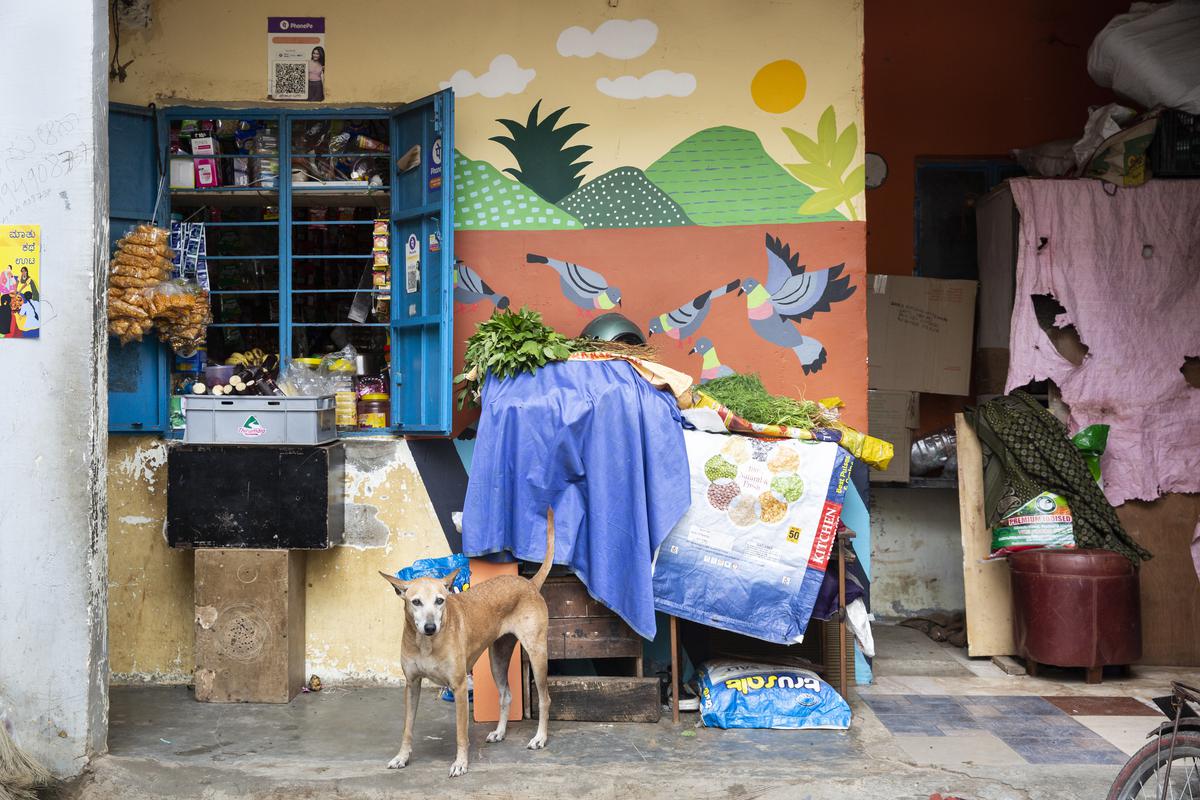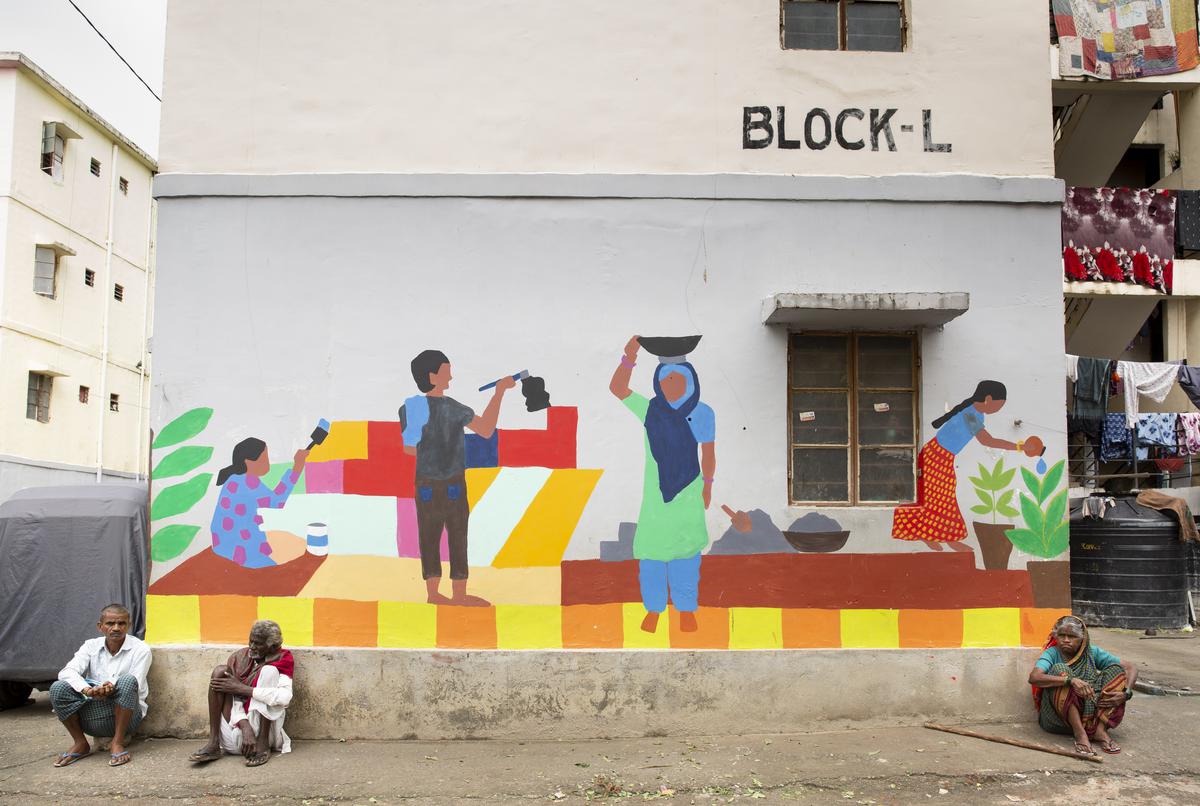When Shanthi Muniswamy, moved into the new slum board quarters at Marathahalli, she noticed something. “Every morning, I would see beautiful quilts drying in the sun,” says the Bengaluru-based trans artist and writer. She took a photograph of this and sent it to Poornima Sukumar, the founder-director of the Aravani Art Project, an intersectional movement that is working towards the betterment of the transgender community via art. “That is when the magic happened,” recalls Shanthi, who is also part of the Aravani Art Project.
Shanthi’s photograph led to the Aravani Art Project partnering with Alli Serona, a collective working on the mobility needs of Bengaluru’s informal sector, to conduct six workshops for the women living in the Marathahalli Slum Board Quarters. These workshops, conducted in September and October last year, were part of a larger initiative to “create multiple movements of collective engagement,” says Tanisha Arora, a part of the Alli Serona collective.
Some of the ladies living in the Marathahalli Slum Board Quarters attended the screening
| Photo Credit:
Falana Films
The Marathahalli Slum Board Quarters initiative is part of a larger movement to increase the civic participation of the most underrepresented communities when these decisions are being made to transition to a low-carbon economy. Alli Serona wants to enable informal sector workers to have a dialogue, talk about mobility needs and share their solutions, taking into account the need to create a more sustainable, low-carbon city. “Everyone is transitioning to low-carbon mobility,” says Tanisha, pointing out that many cities are working on better public transport, creating cycling lanes and so on.
While that is happening, it is not an inclusive transition. Although the impact of climate change is most felt by vulnerable communities, their voices are often not considered when decisions are made. “They are the ones whose livelihoods are badly affected,” says Tanisha, adding that these communities are more dependent on public transport. “We realised that public transport was not serving them fully.”
Using art and culture to bring communities together is a core aspect of what Alli Serona is trying to do, starting a larger conversation about collective mobility needs. “These activities create multiple moments of collective engagement,” she says, adding that this, in turn, creates more cohesive communities, who will be more empowered to take their needs to decision-makers. “Any need is more visible when people are together.”

The murals at Marathahalli
| Photo Credit:
Sujata Khanna
Creating spaces for women
The Marathahalli Slum Board Housing Quarters are demographically diverse, filled with people who were relocated from the informal settlement in the area. “Most of the women who live here are migrants from North Karnataka,” says Shanthi, adding that they work as construction workers or in housekeeping — long, tiring jobs that leave them with little time for themselves. “They get only the weekends off, and they are busy cooking or washing clothes on those days,” she says. “It is very difficult for them to come out.”
These workshops, which included activities such as rangoli making, block printing, kowdhi or quilt making and mural creation as well as a mobility workshop and potluck, ended with a more unified community of women. “Participatory art practices can help empower women,” believes Tanisha, adding that collective creation, away from the daily grind can offer them a shared opportunity for dialogue, self-expression, and mutual connection. “Slowly and gradually, women are able to sit next to each other, share resources, and understand why it is important to come together,” she says.

More murals at Marathahalli
| Photo Credit:
Sujata Khanna
Shanthi attests to the fact that the workshop has changed the community dynamic for the better. “After the mural workshop, I saw women occupying more space outside,” she says, pointing out that earlier only men were spotted loitering outside their homes. “It made me so happy.”
A film for the informal sector
One of the most significant outcomes of these workshops was a documentary film, titled Alli Serona: Together in Art, which attempted to raise a number of pertinent questions about the power and joy found in creating communities, the need for women to reclaim public spaces and carve out time for themselves, the transformative power of art and so much more.
This film, made by Falana Films, one of the organisations that form part of Alli Serona, was recently screened at the Alliance Francaise, Bengaluru for the women in the informal sector, many of whom made an appearance in the film.
One of them is Mallika Paati, who, in the film, explains the practical difficulties of attending these workshops. “Some people are able to come and some cannot,” she says, pointing out that while some women were available, many had to balance the workshops with their day job. “I thought I’d attend the first workshop and then discontinue since I had other work to do,” says Shobha, another resident, who admits to liking the learning these workshops offered. “Once I came here and saw everyone, it made me happy,” she says, on camera.
A panel discussion focusing on the impact of participatory art practices followed this film screening. The 45-minute discussion, moderated by Shreya Krishnan, had Bindu Chandana (Ficus Ideas), Shanthi Muniswamy (Aravani Art Project), Tanisha Arora (Purpose Climate Lab), Indu Anthony (an independent artist) and Netra Ajjampur (Studio Sorted) talk about the social change possible with these practices. “Change is a heavy, loaded word,” says Indu, pointing out that change does not happen overnight; it involves a significant amount of time. Instead, “starting a conversation is a great place to begin anything,” she believes.
The film can be accessed at www.youtube.com/watch?v=t-Fes6qk1d8
What is Alli Serona?
*Alli Serona is a collective working on the mobility needs of informal sector workers
It believes that participatory art practices create more cohesive art communities
They have recently conducted a recent series of workshops at Marathahalli Slum Board Quarters
The outcome of these workshops, a movie titled Alli Serona: Together in Art, was recently screened in the city